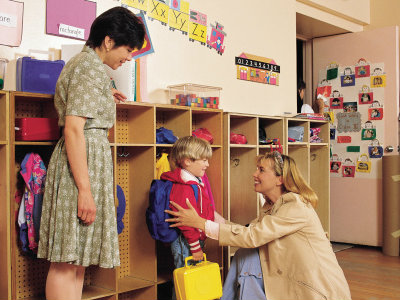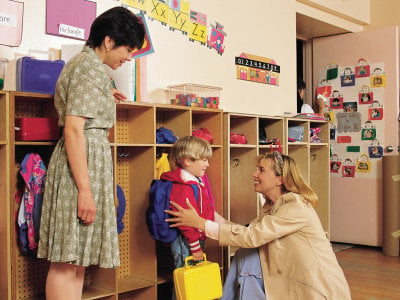 It’s exciting when the day arrives that your child heads off to preschool for the first time. But be aware it’s not unusual if your child experiences separation anxiety. As HealthyChildren.org points out, by the time a child is 3, he or she typically knows you, as the parent, will be affected by his or her pleas not to leave yet. “It doesn’t mean they aren’t stressed,” the article reads, “but they certainly are vying for a change.” So, what do you do?
It’s exciting when the day arrives that your child heads off to preschool for the first time. But be aware it’s not unusual if your child experiences separation anxiety. As HealthyChildren.org points out, by the time a child is 3, he or she typically knows you, as the parent, will be affected by his or her pleas not to leave yet. “It doesn’t mean they aren’t stressed,” the article reads, “but they certainly are vying for a change.” So, what do you do?
Overall, consistency is key. If you’re the one who drops your child off at preschool, develop a dropoff routine, one where you briefly provide your child your full attention without drawing the process out. This can work well, the article says, “Even if you have to do major-league-baseball–style hand movements, [or] give triple kisses at the cubby.” If the ritual goes on too long, though, that only provides more time and opportunity for the anxiety to swell. Make sure your child knows when you’ll return, in language he or she understands, such as “after the afternoon snack is eaten.”
Education.com also offers tips, including:
- It’s important for you to remain calm, because your child will pick up on your mood.
- Avoid leading questions that suggest to your child that he or she SHOULD be anxious. An example includes: Are you worried about being away from Mommy tomorrow?
- Do your best to always be on time to pick up your child.
Note, too, that separation anxiety can take different forms. While one child may clearly act nervous when it’s time for Mom or Dad to leave, others might argue about getting dressed in the morning or throw a tantrum about something seemingly unrelated.
Here are more tips. These are from the New York Times:
- Never sneak out of the classroom. Think about how your child will react once he or she realizes this happened—and what the teacher will have to contend with.
- Never make promises you can’t keep. This may temporarily address a situation, but will be counterproductive in the big picture.
- Expect some regression in your child’s progress. It’s possible that, during week one, your child will be doing great, while other children are struggling with the transition—but then your child could have separation anxiety during week two.
- Keep other routines stable. This is not a good time to change dinner time, for example, or bedtime routines.
- Remind your child how he or she is a master at getting used to new places. Did he or she used to be afraid of the zoo, but now loves to visit? That would be a great example to use to remind your child.
Finally, be creative! Scholastic.com shares a tip from one parent who created a “Secret Picture” to reassure her children. Both of them needed to bring a plastic crayon box to school, so this mom taped a laminated family photo on the bottom, adding, “I Love You” at the bottom. Now, whenever her kids are coloring, they can take a peek at the bottom of the box and feel a family connection.
Looking for more ways to enrich your child’s learning and life? Horizon Education Center provides affordable quality care including educational and enrichment opportunities for children in the following Northeast Ohio locations.






